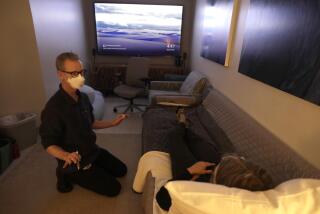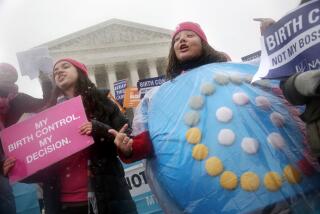Panel Asks That Breast Implants Stay Available
- Share via
WASHINGTON — A federal advisory committee recommended Thursday that widely used silicone gel breast implants be allowed to remain on the market while researchers continue trying to resolve serious questions about their safety.
The General and Plastic Surgery Devices panel, a committee of outside experts that advises the Food and Drug Administration, concluded after three days of hearings that a pressing public health need exists for the implants--particularly for breast reconstruction after cancer surgery.
Some witnesses had suggested that the implants, which contain silicone that may pose long-term health problems in the human body, should not be used for purely cosmetic augmentation. But panel members decided not to distinguish between continued availability for reconstruction after a mastectomy and for augmentation.
The FDA has said that it will announce a decision on the future of the devices by Jan. 6, 1992. The advisory committee’s recommendations are not binding, but such panels typically wield considerable influence on final decision-making.
“It would be insensitive, unconscionable and cruel to deny women with breast cancer access to these devices and it would wreak havoc with the management of breast cancer,” said Dr. Jules Harris, a panel member who is director of medical oncology for Rush Presbyterian Saint Lukes Medical Center in Chicago. Harris said that he believes many women will fail to seek early detection of breast cancer if they believe the option of reconstruction is not available.
But he said he is reluctant to make a distinction between making implants accessible to breast cancer patients and those who want to enlarge their breasts. “These implants ought to be deemed necessary for public health while manufacturers continue to collect data about their safety and effectiveness,” he said.
The strong and often emotional voices of women on both sides of the issue turned the panel’s hearings into powerful drama. Many testified in compelling terms about the profound positive difference the implants have made in their lives, while others condemned them as the source of serious and debilitating pain and injury.
Marc A. Lappe, professor of medical education at the University of Illinois and a consultant to the panel, pointed out the tragic cost of “failure to take early warning signs” seriously enough. He recalled such past medical disasters as the Dalkon Shield, an intrauterine device that injured many women, and DES, or diethylstilbestrol, a synthetic hormone widely given during pregnancy between 1940 and 1970 to prevent miscarriage. It has since been suspected of causing cancer in the women’s offspring.
“Your first obligation is not to produce new harms if you can help it. . . ,” he said. “You cannot maintain the status quo, allowing market forces to determine who gets hurt and who benefits.”
While recommending that breast implants remain available, the panel concluded that the manufacturers of the devices had thus far failed to provide enough scientific data to prove that they are safe. It suggested that the FDA establish a deadline to obtain the necessary information.
“I should emphasize that this does not mean that we found evidence that the implants are unsafe,” said Dr. Elizabeth Connell, professor of gynecology and obstetrics at the Emory School of Medicine in Atlanta, who chairs the panel. “Instead, we found that there was not enough information to be certain about risks and benefits, one way or the other.” The committee raised the possibility of a national registry that could track women with implants over time and document their health problems.
Breast implants have been on the market for three decades. An estimated 2 million women now have them. About 150,000 women every year have implant surgery--80% of them for cosmetic reasons, the rest for reconstruction following cancer surgery.
There are known risks associated with the devices. These include hardening, caused by the scar tissue that develops around the implant after the surgery, leakage of silicone gel from the implant, rupture of the device and interference with mammography readings.
There are also several suspected dangers, more serious but as yet unproved, including cancer and autoimmune disease. Numerous women have attributed such connective tissue disorders as arthritis, lupus and scleroderma to the implants but the scientific evidence is inconclusive.
No reliable estimates exist on how widespread the problems are; the evidence is largely anecdotal.
Implants were introduced before the 1976 legislation that gave the FDA the authority to regulate medical devices; thus manufacturers were not required to meet current standards for establishing safety. However, the law provided that manufacturers of products already on the market could be required at some future point to prove that they were safe.
FDA Commissioner David A. Kessler said that the agency would take the panel’s recommendations “very seriously,” adding that he was “struck” by the lack of data available after three decades on the market.
“We need to get to the bottom of this,” he said. “Women deserve no less. We’ve heard that there is no immediate hazard. But saying that is not synonymous with saying they are safe.”
Dr. Robert Levier, technical director of health care business for Dow Corning Corp., the largest manufacturer of the silicone gel implants, said that he is “very grateful that the panel has recognized the public health need so graphically expressed by women at this hearing.”
He said that the company is “fully prepared” to discuss additional studies and “how they should be done.”
“We have a high order of confidence that we are going to work this out,” he said.
RELATED STORY: D1






